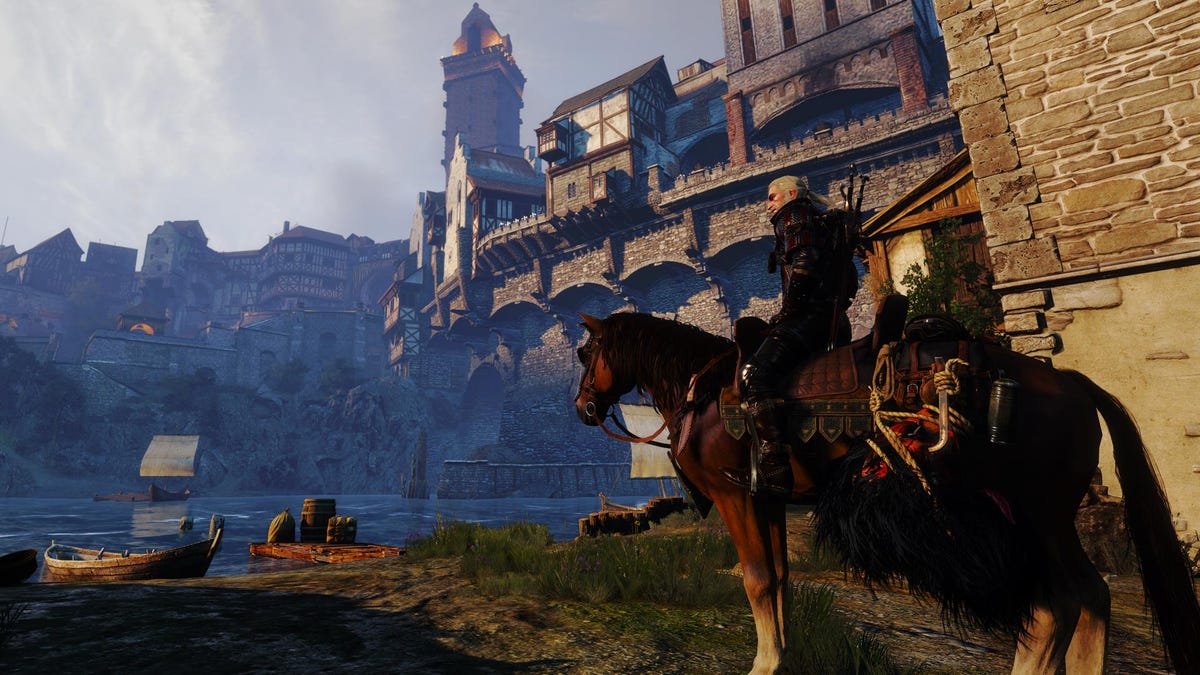The Witcher 3: Wild Hunt is an enormous game that easily justifies its size and scope. That said, even the best of games sometimes fall off our radar, taking up space in the seemingly endless realm of the “Backlog.” Whether another new game you were interested in came along and demanded your attention, or life got in the way of finishing Geralt’s journey, The Witcher 3’s size might’ve been a bit too much to keep up with.
What Is Dragonsplague? Dragon’s Dogma 2’s Devastating Contagion Explained
No matter how or why you fell off The Witcher 3, however, jumping back in is totally doable. Not only that, as one of the best games of the last decade, it’s worth it to cross The Witcher 3 off your list of unfinished games.
How long is The Witcher 3?
According to Howlongtobeat.com, a straight run of The Witcher 3’s main story will cost you about 50 hours. If you jump into extra side-quests and activities, you’re looking at 100. A full completionist run flies close to 200 hours. Its first expansion, “Hearts of Stone” will average 10-20 hours from the main story to a completionist run. Meanwhile the larger second expansion, “Blood and Wine,” offers a 15-hour main story, with as much as 40+ hours of stuff to do if you want to 100-percent it.
Read More: What Someone Who Spent 1,800 Hours In The Witcher 3 Actually Did
So, yeah, The Witcher 3 is a big game. There’s no way around that. And as many have said since it first released in 2015, its side-quests are well worth the effort. It’s hard not to want to do everything in The Witcher 3 once you really immerse yourself. But if you’re strapped for time, the main story is long, but very doable at 50-ish hours.
Resume or Restart?
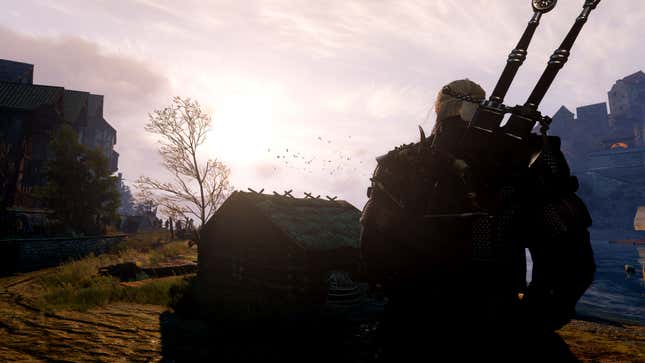
Let’s say you find yourself staring at a Witcher 3 save file from three, four, or even five or more years ago. Should you just jump back into that one? Or is it best to start up a new game?
Sometimes starting from scratch is the best way to begin clearing a game out of your backlog. If you struggle to remember just about anything from your last time with the game, you might be better off just hitting New Game at the start and taking everything in fresh.
Read More: The Witcher 3 Finally Won Me Over
When I first started playing The Witcher 3, I fell off for a period of about four months and by the time I returned, I struggled to remember just what the hell was going on. Loading in, I realized I’d forgotten all the major NPCs, most of the mechanics, and had a giant inventory of stuff that just felt overwhelming to sift through. So I booted up a brand new game and ended up 100-percenting the hell out of it. The Witcher 3 would go on to become one of my absolute favorite games of the 2010s as a result. Had I chosen to keep pushing through an old save, I might’ve been too lost to soak it in so freshly and failed to enjoy it as much. Don’t underestimate the value of starting from scratch with a new game, ready to immerse yourself in something as if it’s the first time.

What about The Witcher 1 and 2?
The first two Witcher games didn’t exactly make Geralt a household name among gamers. Thus, The Witcher 3 is probably the first Witcher game many have played. So if you’re in a total completionist mood, should you go and play those first two games?
If you have the time to commit to three large RPGs before taking on an even larger one, I’m gonna tell you to go for it. I played The Witcher 3 first and then went back and enjoyed the heck out of the first (yes, it’s janky but still wonderful) and second one. Do keep in mind that there is a remake of the first one on the way from CD Projekt Red. Still, you can’t go wrong having more of these fantastic characters in your life, but you don’t need to play the first two right away.
That said, starting from scratch isn’t always the best option. Ask yourself what you remember from the last time you were regularly playing Geralt’s third outing. Did you reach a particularly high level? Was there an annoying boss that you’re definitely not in the mood to fight ever again? Did you find some great loot or earn some powerful alchemical formulas? Do you have a generally good idea of where the story was when you left off and are eager to see where it goes?
If your answer is “yes” to questions like that, you probably should just load into your most recent save, ready to swing some swords and cast some signs.
Fortunately, you’ll hear a short narration of what’s going on in the main story once the game starts loading. Once you’re back in Geralt’s boots, you can also take a look at active and completed quests. Completed quests are handy to get a sense of what you’ve already done, but seeing as the menu sorts them alphabetically, it’s not the best at getting a chronological sense of what you’ve done. That said, taking a look at what you’ve completed might be enough to jog your memory.
How to best return to an old save file in The Witcher 3
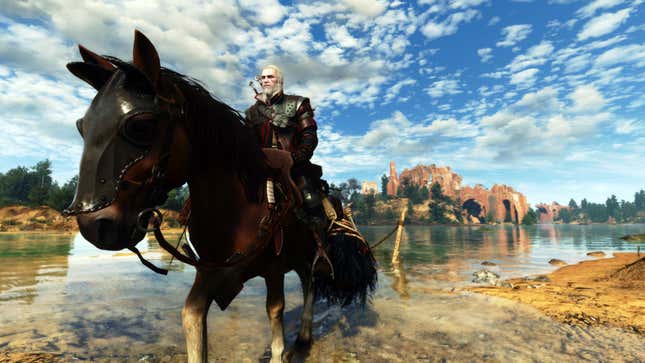
Depending on how far you got the last time you played The Witcher 3, and how much of it you remember, you might have different priorities. If you freshly remember a specific quest you were doing and have no trouble remembering the basics of combat, I suggest grabbing whatever quest is active and wrapping it up. That said, I’d advise working on a side-quest or monster contract first so you can refresh your memory of the core mechanics (and maybe details about the world, too) before jumping back into the main narrative for the first time in years.
But if you want to resume an old save and you are completely lost, here are some tips to get a handle on the game again. I advise doing these before you jump into a narrative quest if you find it hard to remember what exactly is going on in the story.
If you haven’t finished it, track the Gwent ‘Collect ‘em All!’ quest
Sadly, you can’t choose to not track a quest in The Witcher 3. This can result in a distracting set of yellow dots on your mini-map and possibly a large list of objectives on the right side of your screen.
Actively track the “Collect ‘em All!” quest, however, makes for a good workaround. It won’t put a marker on your map and the objective takes up very little screen real estate. Be sure to chat with Albert Geert in the White Orchard tavern if you don’t have this quest.
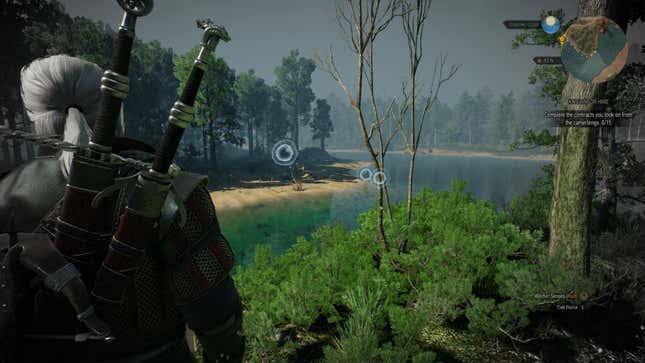
Head to White Orchard and wander around a bit
While you can and should just wander around the open world a bit, I advise heading to White Orchard first. If you have miscellaneous tasks and question marks on the map there, wrapping up those objectives will help you get a hold of the basics. Even if you’ve cleared that map, however, the monsters here are on average so low in level that you’re free to screw up and fumble your way toward learning the combat system again.
Pick a direction and just walk through the forests, fields, and towns. Soak in the world and let yourself get immersed.
Practice combat on low-level monsters
As you’re walking around, you can activate your Witcher Senses with Right Mouse Button/Left Trigger to hear if there are any enemies nearby. Head to an area where there are some monsters and get ready to practice some combat basics.
I advise getting the hang of parrying and counter-attacking first, as it’s really important to succeeding in combat in The Witcher 3. You can do this by activating your block (Right Mouse or Left Trigger) just before an enemy’s attack hits you. Done successfully, you’ll not only block the attack, but you’ll attack yourself, doing damage or sending your enemy back a few steps.
Once you have the hang of swordfighting once more, refresh your memory on what your signs do:
- Aard: Knocks an opponent back
- Yrden: Deploys a magical sign that will trap enemies
- Igni: A flame attack
- Quen: Shields you
- Axii: Messes with a character’s mind
Depending on your level, what you’ve invested points in, and how you’ve augmented your abilities with Mutagens, these signs will function differently. After you’ve familiarized yourself with how to use them in combat, pop into the main menu to see how they’re set up, whether they’re still on the starting, default options, or if you’ve modified them in a past playthrough.
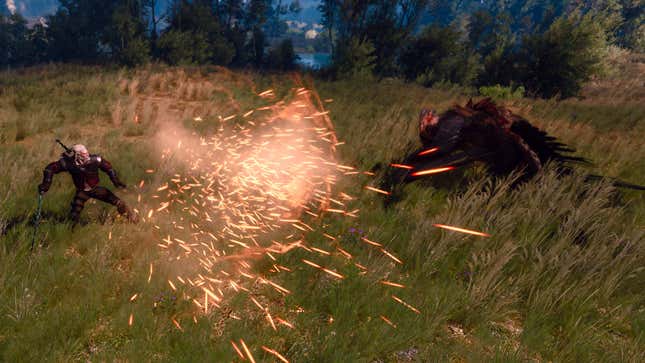
Restock on items, potions, bombs, and oils
Once you’ve started to refresh yourself with how combat works again, you should take stock of your current inventory. As you may remember, preparing for fights with oils, bombs, and potions is an integral part of combat in The Witcher 3. See what formulae you have and get to crafting, collecting, and buying resources when necessary.
Check out what monster hunting needs to be done around town
Now that you’ve refreshed yourself on the basics of combat, have restocked your resources, it’s time to see what monster hunting needs done. Some monster contracts have stories that are more interesting than “go kill that monster over there,” but they all pretty much have a central antagonist that you need to pursue and equip yourself to fight. That makes monster hunting a pretty effective set of training wheels for jumping back into more elaborate side-quests and the main story.
Use the menu to read up on NPCs
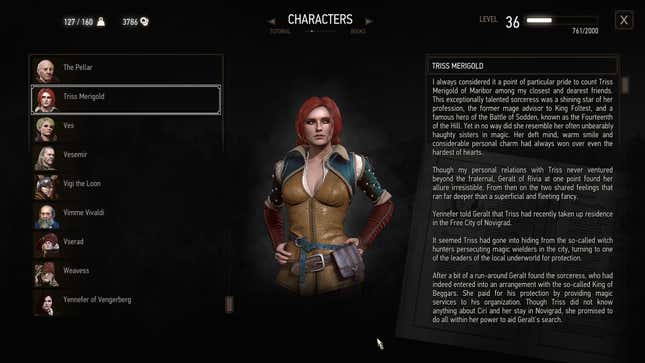
Unless you’ve got a perfect memory of everything in The Witcher 3 from the last time you played it, you should check out the “Characters” section of the menu to refresh your memory as to who’s who. These bios will reflect events that have happened in the game, so they’re not just history lessons.
The Witcher 3 is a modern classic. If you enjoy medieval fantasy and RPGs, you owe it to yourself to check this one off your backlog, whether you’re jumping into a brand new game or picking up the pieces of one you’ve left behind a while ago.
